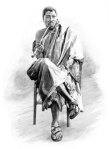
This famous speech of King Béhanzin is the last strong message he gave on January 20, 1894, in homage to his army which he always praised the courage, and bravery of the soldiers and amazons. For the original, click here. Since this is such an important piece of African history, I decided to translate his farewell speech into english. Enjoy!
“Fellow sufferers, last faithful friends, you know the circumstances under which, when the French wanted to grab the land of our ancestors, we decided to fight.
We had the certitude to lead our army to victory. When my warriors rose by the thousand to defend the Danhomè and his king, I recognized with pride the same bravery manifested by those of Agadja, of Tégbessou, of Ghézo, and of Glèlè. I was by their sides in all the battles.
Despite the legitimacy of our cause, and our courage, our compact troops were decimated in an instant. They could not defeat the white enemies whom I also praise the courage and discipline. And already my weeping voice arouses no more echo.

Where are now my ardent amazons who were inflamed by a mighty anger?
Where are their indomitable chiefs: Goudémè, Yéwê, Kétungan?
Where are their robust captains: Godogbé, Chachabloukou, Godjila?
Who will praise their splendid sacrifices? Who will tell about their generosity?
Since they sealed the pact of supreme loyalty with their blood, how could I accept any sort of abdication without them?
How could I dare presenting myself in front of you, brave warriors, if I signed the general’s paper?
No! To my destiny I will no longer turn my back. I will face it and walk. For the greatest victory is not won on a hostile army or on adversaries condemned to the silence of the dungeon.
Is truly victorious, the man who, as the only survivor, continues to fight in his heart. I do not want that at the gates to the land of the dead, the customs man finds dirt at my feet. When I will see you again, I want my belly to open up with joy. Now, may anything happen to me that pleases God ! Who am I for my disappearance to be a gap on earth?

Go, you, last living companions. Return to Abomey where the new masters promise a fresh alliance, safe lives, and it seems even freedom. There, it is said that joy has been reborn. There, it seems that the whites will be as favorable to you as the rain that drapes the flaming red velvet or the sun, which gilds the silky beard of the ear corn.
Missing companions, unsung heroes of a tragic epic, here is the offering of remembrance: a bit of oil, a bit of flour, and a bull’s blood. Here is the renewed pact before the great departure.
Farewell, soldiers, farewell !…
Guédébé … stand up, like me, like a free man. Since the blood of the soldiers killed guarantees the resurrection of the Danhomè, no more blood should flow. The ancestors have nothing more to do with our sacrifices. They will rather taste the pure homage of the faithful hearts united for the greatness of the nation. That is why I agree to engage in the long night of patience where germinates the lights of dawn. Guédébé, as a peace messenger, go to Ghoho where general Dodds is camping.
Go tell the conqueror that he did not harpoon the shark.
Go tell him that tomorrow, at day break, of my own free will, I will surrender in the village of Yégo.
Go tell him that I agree, for the survival of my people, to meet in his country, according to his promise, the president of the French.”
Translation by Dr. Y. on http://www.afrolegends.com of the original from Kondo le requin – Jean PLYA – Ed. CLE.


Thanks for the translation.
– Mathias
LikeLike
Thanks for visiting my blog.
LikeLike
Pingback: Le Discours d’Adieu du Roi Behanzin « African Heritage
Soul searching and full of profound emotion.
A very great speech
Many thanks for bringing it up
LikeLike
Great speech! He was a TRUE warrior. We need this warrior spirit NOW more than ever!
LikeLike
Totally agree with you on that!
LikeLike
Do you know of any videos or audio of this speech, perhaps a re-enactment of it, that is available to the public. I am currently teaching a part of the speech to children in 8th grade, and the only audio provided is by a British-sounding white man; it just doesn’t seem appropriate to play this audio to a group of Afrikan students, considering its subject matter. Honestly, it sounds really silly and I just can’t bring myself to play it for them. I’d prefer a version of it in the voice of an Afrikan man.
LikeLike
Thanks Carmen for teaching this great subject to your 8th grade students. I do not know of any audio in English of the speech. The version I know is in French, and is spoken by a Beninese. https://www.youtube.com/watch?v=oz-P83-mp5M
I will keep looking. You could also have one of your African students read the speech in English?
LikeLike
Actually, I could ask one of my colleagues from Benin to read it and post it, someone who speaks the language (i.e. can say the name properly)… would you like that?
LikeLike